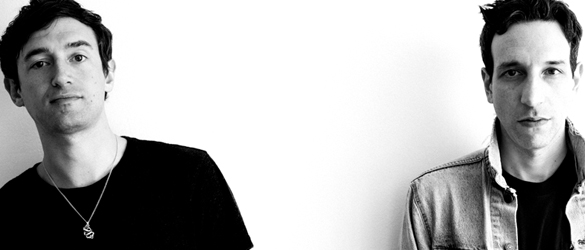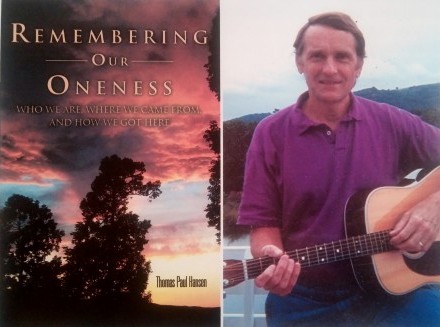Jesse Cohen and Eric Emm sat relaxed in leather couch in the back of DC9 as they waited for showtime to roll around after their soundcheck. Both members of Tanlines wore jeans with a denim shirts and denim jackets, which they quickly pointed out and mocked themselves for. I had forgotten my notebook of questions in my rush to get through DC traffic and parking in time, and thusly the interview opened up with a back and forth about denim and boots, which I will spare you. After that though, Cohen and Emm deftly handled my open-ended questions with humor and acuity.
With your album, I really wanted to find out what it was about, what your main goals were for it. I know that’s a horrendously broad question…
COHEN: Then we’ll give you a horrendously broad answer. [laughs]There’s not a simple answer. To me, we sat down to write this album, and I just sort of hear that time of our lives. This album came at a crossroads in both our personal lives and also in our careers as musicians. It was sort of about figuring out what is the meaning of adulthood and what kind of life we want—that was the shit that was going on in my head as were working on it. Someone said it was a great “mid-mid-life crisis album,” and that’s about right. But it isn’t like, “oh, all these songs are about my ex.” There isn’t a story like that. We paint with broader strokes when it comes to meaning, in that way. It’s emotionally abstract. The songs aren’t stories for the most part—though maybe a couple are inspired by more specific things.
EMM: Some of them are. There are these broad, basic life-experience songs that you can plug your own experience into a little bit. But there’s no specific theme, like an ex-girlfriend or a death in the family or something like that. It’s just life.
COHEN: I think I like “emotionally abstract,” that’s a thing I hadn’t said before…
EMM: It’s emotionally abstract, existential pop.
COHEN: Yeah. There’s definitely a lot of emotion in it but…
EMM: Without being emo.
Or too open.
EMM: I’ve heard some people refer to the lyrics as cryptic.
COHEN: Or vague.
EMM: And I’ll take that as the abstract side of it. I see the lyrics as fairly plain. I don’t think they’re dressed up too poetically. They’re not attempts to be clever or something like that. But the broader theme would probably be a mid-mid-life crisis.
COHEN: Growing pains.
EMM: Thirty-something growing pains.
Where does the name Tanlines come from?
COHEN: It’s not a good story. We needed a name to put the thing on the internet. A lot of times we’ll write songs and then at the end of the night Eric will drop me off at home and we’ll talk about stuff, figure stuff out, and it was one of those nights. We wanted to put something out and we needed a name for it, and we saw it written on the back of truck and decided that it would be fine, and now we’re stuck with it.
EMM: It had more meaning than that. It wasn’t just like let’s pick a random word that sounds cool.
COHEN: It worked because we’re two white guys sitting in-doors most of the time, working in a studio, and it’s nice outside and the music we make sounds “warm,” or has some warmness to it. It’s sort of a reflection of that. And it’s musical—like a bass line, a keyboard line, a striped shirt, a nautical striped shirt. [laughs] There’s all that stuff in it.
EMM: It’s like naming a child or a dog or a pet. So you like it, and you think it’s great for a while, and then you know…
COHEN: Hopefully by the time you get sick of it, you have defined the word more than it has defined you.
EMM: In a lot of ways the name is a stamp of something I’d rather not be stamped with, but there’s nothing you can do.
What is that?
EMM: The implications are, when your name is Tanlines, people come see you with ideas like, “Oh, what if we took a photo of you guys, like, with sunburned faces.” And it becomes that, a lot. It’s like this literal thing” “oh your music is sooo sunny,” or “I get tan lines just listening to it.”
COHEN: If we were like a thrash band or noise band called Tanlines that would be cool. Because it would be a contrast, though I still think of it as a contrast—the name and who we are as people. But I think the music we make, it fits in with it, it’s congruous in a way.
EMM: [grudgingly] Yeah. I guess we can only blame ourselves for that.
COHEN: It’s not a big problem. Like I said, I think the name Animal Collective is a terrible name. If you saw an Animal Collective sticker on a wall of band stickers in the back of some club and you didn’t know they were some amazing, amazing band, you’d be like “oh that’s a crappy name.” But they define it, and that’s what you want to be able to do.
Are there any artists who had a big influence on this album, or just your music generally?
EMM: When I think of this album, I think of all music, the act of making music, as having a dream. It’s all the things you’ve ever taken in, filtered out. The easy, simple answer: it’s everything I’ve ever listened to and nothing at the same time. Because all those things equal this other thing, and that’s the album.
COHEN: Again a broad, horribly broad answer, but that’s exactly what I would have said too.
Your music makes you want to ask broad questions.
EMM: Because it calls into question life.
It’s that existential pop.
EMM: The existential pop music dilemma. I don’t know if it answers the questions.
COHEN: If it answers the questions, it answers the questions with a question.
EMM: As vaguely as they were asked.
What would that final question be?
COHEN: Where did you get those boots?
EMM: Do you dry-clean those APC jeans? [laughs]
COHEN: You ever read the Hitchhiker’s Guide to the Galaxy? What’s the answer to everything? Forty-two? [laughs]
Was it a conscious decision to make the album emotionally abstract? Or was that just how it came out?
COHEN: You’d have to ask Eric about how he writes songs. I think a lot of that comes from the lyrics.
I think the music is that way too. It doesn’t really push you. It leaves some space…
COHEN: It doesn’t direct you exactly where to go.
GADFLY: No, not quite.
COHEN: Maybe so, I have to listen to the listener.
EMM: It’s so hard to know, being so close to it. You think a lot of things about these songs that other people will never think. You find out you’re wrong. I think I expect too much that people are on my same wavelength. That might come through in the music.
COHEN: From my perspective, not about the lyrics, one of the worst vibes you can project as an artist is, “why aren’t you guys dancing?” “Come up closer, to the front guys!” That’s one of the worst vibes you can project. I think your job is just to do the thing that you want to do. I think there are dance music producers that are like, “I’m gonna write a song to make people dance. I’m gonna make an epic break. I’m gonna make an epic climb, and then a thing, and then a this.” And we don’t think that way at all. We don’t think of ourselves as dance anything. If the name of the music is an action, I just… then I don’t know.
There is a danceability to your music.
COHEN: Absolutely, absolutely. But it’s not in the genre.
EMM: We hear people say all the time, “Oh I’m at work, sitting in my chair dancing to Tanlines.”
COHEN: That in itself is a little abstract.
EMM: I think you’ve uncovered something that maybe we haven’t yet. We’re fucking abstract-experimental.
Abstract expressionist, existentialist pop.
EMM: We’re abstract expressionist.
COHEN: But just in the vaguest sense.
This interview originally appeared atPretty Much Amazing, a music site we think is pretty alright.



